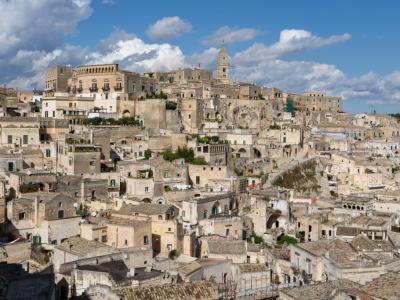Belvedere Piazzetta Pascoli (Pascoli Square Belvedere), Matera
Pascoli Square Belvedere may be small in size, but it has long punched above its weight in Matera’s story. Tucked beside the 17th-century Lanfranchi Palace-once a Dominican seminary, now home to the National Museum of Medieval and Modern Art of Basilicata-it carries the name of poet Giovanni Pascoli, who briefly taught here in the 19th century. For a man of words, this outlook would have needed none: the view alone speaks volumes.
From the parapet, the Sassi districts stretch out in layers-Sasso Caveoso and Sasso Barisano clinging to the limestone cliffs, with the Gravina gorge plunging below and the Murgia plateau beyond. The cathedral rises on the ridge, rupestrian churches mark the cliffs, and at night the caves glitter with light, as if Matera itself were a constellation set into stone.
The square has also doubled as a stage for art and reflection. In 2011, Japanese sculptor Kengiro Azuma placed The Drop here, a bronze monument nearly three meters tall, a reminder that water has always been the lifeblood of the city carved into rock. Long before that, in the 17th and 18th centuries, this terrace was part of Matera’s baroque expansion, linking the civic quarter with the ancient cave districts below. By the 20th century, it had settled into the role of gathering ground, alive with markets, concerts, and public life.
Today, Pascoli Plaza balances past and present. It frames one of Matera’s most photographed panoramas while remaining a lived-in square, where everyday chatter mixes with centuries of history beneath the open sky.
From the parapet, the Sassi districts stretch out in layers-Sasso Caveoso and Sasso Barisano clinging to the limestone cliffs, with the Gravina gorge plunging below and the Murgia plateau beyond. The cathedral rises on the ridge, rupestrian churches mark the cliffs, and at night the caves glitter with light, as if Matera itself were a constellation set into stone.
The square has also doubled as a stage for art and reflection. In 2011, Japanese sculptor Kengiro Azuma placed The Drop here, a bronze monument nearly three meters tall, a reminder that water has always been the lifeblood of the city carved into rock. Long before that, in the 17th and 18th centuries, this terrace was part of Matera’s baroque expansion, linking the civic quarter with the ancient cave districts below. By the 20th century, it had settled into the role of gathering ground, alive with markets, concerts, and public life.
Today, Pascoli Plaza balances past and present. It frames one of Matera’s most photographed panoramas while remaining a lived-in square, where everyday chatter mixes with centuries of history beneath the open sky.
Want to visit this sight? Check out these Self-Guided Walking Tours in Matera. Alternatively, you can download the mobile app "GPSmyCity: Walks in 1K+ Cities" from Apple App Store or Google Play Store. The app turns your mobile device to a personal tour guide and it works offline, so no data plan is needed when traveling abroad.
Belvedere Piazzetta Pascoli (Pascoli Square Belvedere) on Map
Sight Name: Belvedere Piazzetta Pascoli (Pascoli Square Belvedere)
Sight Location: Matera, Italy (See walking tours in Matera)
Sight Type: Attraction/Landmark
Guide(s) Containing This Sight:
Sight Location: Matera, Italy (See walking tours in Matera)
Sight Type: Attraction/Landmark
Guide(s) Containing This Sight:
Walking Tours in Matera, Italy
Create Your Own Walk in Matera
Creating your own self-guided walk in Matera is easy and fun. Choose the city attractions that you want to see and a walk route map will be created just for you. You can even set your hotel as the start point of the walk.
Matera Introduction Walking Tour
Architectural historian Anne Parmly Toxey said the cave areas of Matera had been occupied for at least 3,000 years. Archaeological research shows people lived here since the Paleolithic era, shaping homes and communal spaces directly into the soft limestone. Over centuries, those modest caves expanded into an intricate neighborhood-stone dwellings, churches, and twisting passageways stacked upon... view more
Tour Duration: 2 Hour(s)
Travel Distance: 2.4 Km or 1.5 Miles
Tour Duration: 2 Hour(s)
Travel Distance: 2.4 Km or 1.5 Miles
Matera's Ancient Cave Churches
Within the old city of Matera, there are more than 160 churches. Many of these are actually carved into the soft limestone cliffs lining the Gravina River. There are even some used for pagan rituals. The churches were carved from existing caves and tunnels. More than a few sanctified cave churches have been converted to storage and homes.
A good example to start with is the St. Anthony... view more
Tour Duration: 1 Hour(s)
Travel Distance: 1.7 Km or 1.1 Miles
A good example to start with is the St. Anthony... view more
Tour Duration: 1 Hour(s)
Travel Distance: 1.7 Km or 1.1 Miles





